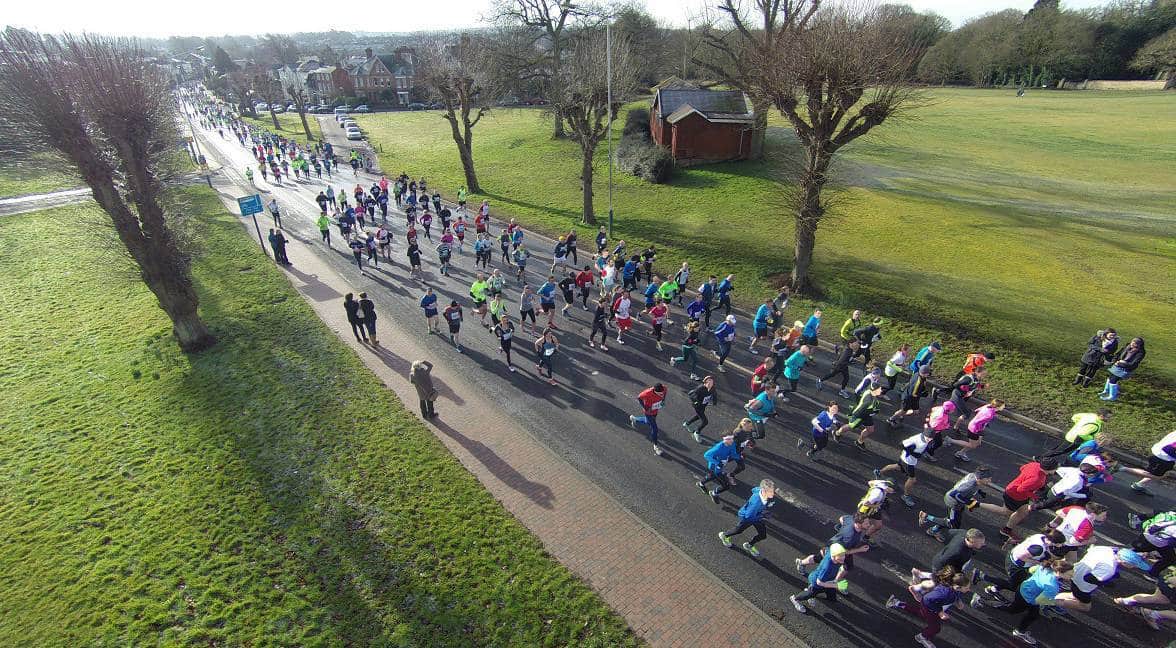PLANSÂ are being finalised for next month’s Tunbridge Wells half marathon which is set to attract some 2,000 runners… and there’s still time for you to enter.
The highly regarded 13.1-mile race, which has been contested for more than 30 years, will be held on Sunday, February 19 starting at 9am. It’s open to all classes from elite athletes to novices.
The organisers, Tunbridge Wells Harriers Running Club, have this year recruited Nuffield Health to help stage the event and the Times has joined the term as the official media partner.
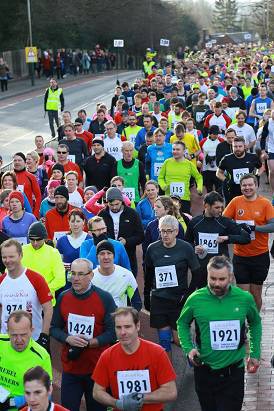
Some 2,000 runners set off down St John’s Roa
The beautiful course takes in the villages of Bidborough, Penshurst and Fordcombe, and features a testing 300ft climb up Spring Hill amid the stunning scenery.
Since the race was first held in 1983, it has become the biggest single sporting event in Tunbridge Wells in terms of public participation.
During those three decades it is estimated that some 30,000 runners have taken part, raising in the region of £200,000 for local charities.
Currently the three main beneficiaries are The Bridge Trust in Tonbridge, which supports the homeless, the Counselling Centre in Tunbridge Wells, and the Dame Kelly Holmes Trust, which helps disadvantaged young people.
Other local voluntary bodies such as Citizens Advice and the Pickering Cancer Drop-in Centre also receive donations along with the three main beneficiaries.
In the last five years alone, worthy causes have benefited to the tune of £85,000 – and the race is going from strength to strength.
Initially, participants numbered around 450 but over the last 10 years there have been, on average, 2,000 people taking part every year.
Race organiser Mark Taylor, a member of the Harriers, says the popularity of the event is akin to a growing enthusiasm for endurance fitness tests generally.
“It’s like the rise of triathlons, and other competitions such as assault courses and mud runs,” says Mark, 63, who ran his first Tunbridge Wells Half-Marathon in 1988. “People are looking for a challenge.”
The public also see the opportunity to raise money for charity while improving their own health – runners are free to raise money for their own worthy causes.
‘It’s well managed and organised by runners for runners.
Feedback is always very positive’
The race, which came second in a recent Runner’s World magazine’s Half-Marathon of the Year vote, attracts all-comers from around the UK and beyond and has become a popular and influential event in the running calendar.
Mark adds: “It is recognised by the running community as a very good half-marathon run through some of the best Kent countryside.
“It’s well managed and organised by runners for runners. Feedback is always very positive. One of the most common comments is what a friendly, well-marshalled event it is, with support all around the course.”
The influx of athletes to the town helps not only charitable causes but also the local economy generally. “It’s one of the yearly highlights in the Tunbridge Wells calendar,” says Mark.
“Most importantly, of course, charities benefit from this non-profit making event but it also brings many people into the town so local businesses benefit too.”
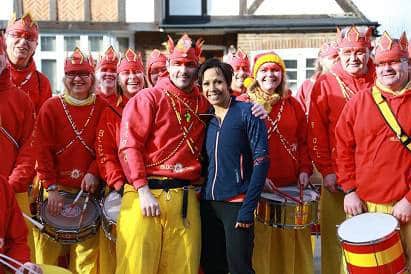
Dame Kelly Holmes with the Bloco Fogo drummers
Dame Kelly Holmes, from Hildenborough, competed last year for the first time as part of the double Olympic champion’s preparations for her inaugural London Marathon.
“No international athlete has given as much time and support to us as Dame Kelly,” says Mark. “She has been with the race in some capacity for many years.”
Other notable supporters include Don Thompson, the 1960 Olympic gold medallist at the 50km racewalk – who has taken part numerous times.
London Marathon winner and Commonwealth Games bronze medallist Mike Gratton of Invicta AC has also been in the running and donated prizes.
In 1999, following a TV promotion, the Kenyan athlete Benson Masha decided to enter. He had previously held the world record time for a half-marathon and won the Great North Run on four occasions.
But according to Mark, ‘he did not have everything his own way’ and Masha found himself beaten by Barry Royden of Medway Athletic Club.
The race has become such a local institution over the last 33 years that a second generation of competitors are busy trying to overall their parents’ efforts.
In 1985 the race was run by Cain Bradley, and 30 years later in 2015 his son Dan also came first – although Bradley Senior’s time was still superior.
Runners of all ages take part, from the minimum age of 17 to octogenarians – the Tunbridge Wells Harriers’ own Graham Brooks is still entering the race at 83.
Some 400 volunteers, most of them Harriers, take part in the meticulous organisation of the Tunbridge Wells Half-Marathon, which has become the envy of the county’s running community.
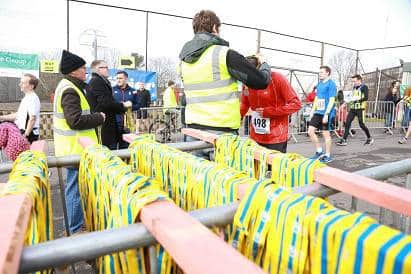
This year it will form part of the Kent Grand Prix – a race series which comprises events across various distances – and also the Kent Senior Championships.
Skinners’ School pupils and teachers have helped out with the organisation of the event, seeing it as an ideal way to promote team building and public service.
Nuffield Health will be providing expertise at the race headquarters in the Fusion Tunbridge Wells Sports Centre on St John’s Road.
Personal trainers from Nuffield’s gyms will be assisting with warm-ups and warm-downs as well as providing free massages after the race.
It will also give each runner a technical fabric running T-shirt, a medal, accurate chip timing and a goodie bag. And there are prizes for men and women in various age-group categories – including the over-80s.
Entry for the race starting at 9am on Sunday, February 19 costs £24 (£22 for England Athletics affiliated club members)
If you would to take part, volunteer to help or find out more technical information, visit www.twharriers.org.uk or www.race-nation.com
Main image: Southborough Common by Blayne Jackson www.xcellaerial.com
The run-in: Five weeks to get ready
If you haven’t already started training for the Half-Marathon, have you left it too late? With five and a half weeks until starter’s orders, it is possible to get race-ready – but not if you’re starting from scratch.
If running a half-marathon is on your bucket list but you haven’t yet started putting in the miles, entering the Nuffield Health Tunbridge Wells Half-Marathon is a goal to put on your agenda for 2018, not this year.
But if you already run two or three times a week and can do 10k, then stepping up to completing the Half-Marathon on February 19 is an achievable target.
“It’s all about the long runs,” explains Jane Dew (pictured right), a fitness instructor at Nuffield Health Fitness and Wellbeing Gym on Knights Park Leisure Park and a run leader for Runtogether (formerly Runengland).
‘If you can already do 10k, or six miles, you need to increase your long run
by a mile each week for the next three weeks’
“If you can already do 10k, or six miles, you need to increase your long run by a mile each week for the next three weeks, so you do seven miles this weekend, eight next week and nine the week after.
“You then need to aim for between 10 and 12 miles the first weekend in February, so you can taper in the fortnight leading up to the event so your legs aren’t too tired on race day.”
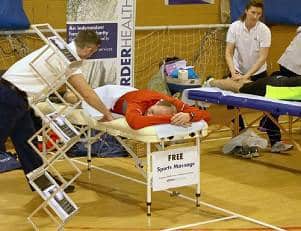
If pacing yourself for 10 or 12 miles seems a tall order, Jane has some good news for you: “Your long runs should be at a conversational pace. Most people do their long runs too fast – they don’t need to be.”
You also need to put in at least two other runs each week. “You want to be doing a 40 to 50-minute run at an easy pace, and then one at a more challenging tempo – faster than is ideally comfortable for you – but only about 30 to 40 minutes,” says Jane.
To feel really confident as you cover the 13.1 miles around the Kent Weald, you ideally want to fit in one other training session each week, but quite what that is will depend on what your ambitions are.
“If you are aiming for a challenging time, then you would benefit from some interval speedwork,” suggests Jane.
“One example is two minutes fast, two minutes’ recovery, 8-12 repeats.
“You can play around with the timing of the intervals, even building up to one-mile repeats if you dare,” she adds. “But if you just want to get round, your fourth training session can be any cardio workout you are used to doing.
“Outdoor cycling or a spin class are great at complementing a running programme – they give you a good cardiovascular workout without impacting on your joints.”
If you’re a gym bunny, you may be tempted to put in a last-minute application for the Half-Marathon, but Jane cautions against it.
“You may be very fit and strong, but running puts a lot of impact on your joints, and you have to build up to that. If you go straight from the gym to a half-marathon, you are likely to cause yourself an injury.”


